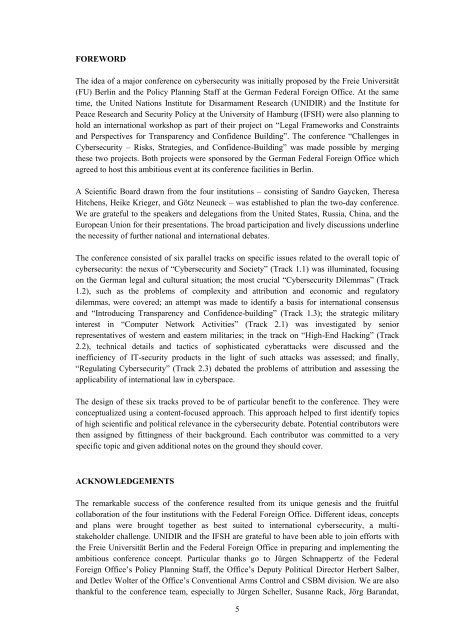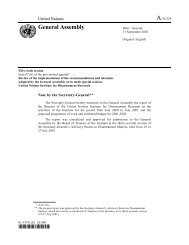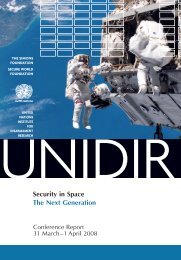Challenges in Cybersecurity Risks, Strategies, and ... - Unidir
Challenges in Cybersecurity Risks, Strategies, and ... - Unidir
Challenges in Cybersecurity Risks, Strategies, and ... - Unidir
You also want an ePaper? Increase the reach of your titles
YUMPU automatically turns print PDFs into web optimized ePapers that Google loves.
FOREWORD<br />
The idea of a major conference on cybersecurity was <strong>in</strong>itially proposed by the Freie Universität<br />
(FU) Berl<strong>in</strong> <strong>and</strong> the Policy Plann<strong>in</strong>g Staff at the German Federal Foreign Office. At the same<br />
time, the United Nations Institute for Disarmament Research (UNIDIR) <strong>and</strong> the Institute for<br />
Peace Research <strong>and</strong> Security Policy at the University of Hamburg (IFSH) were also plann<strong>in</strong>g to<br />
hold an <strong>in</strong>ternational workshop as part of their project on “Legal Frameworks <strong>and</strong> Constra<strong>in</strong>ts<br />
<strong>and</strong> Perspectives for Transparency <strong>and</strong> Confidence Build<strong>in</strong>g”. The conference “<strong>Challenges</strong> <strong>in</strong><br />
<strong>Cybersecurity</strong> – <strong>Risks</strong>, <strong>Strategies</strong>, <strong>and</strong> Confidence-Build<strong>in</strong>g” was made possible by merg<strong>in</strong>g<br />
these two projects. Both projects were sponsored by the German Federal Foreign Office which<br />
agreed to host this ambitious event at its conference facilities <strong>in</strong> Berl<strong>in</strong>.<br />
A Scientific Board drawn from the four <strong>in</strong>stitutions – consist<strong>in</strong>g of S<strong>and</strong>ro Gaycken, Theresa<br />
Hitchens, Heike Krieger, <strong>and</strong> Götz Neuneck – was established to plan the two-day conference.<br />
We are grateful to the speakers <strong>and</strong> delegations from the United States, Russia, Ch<strong>in</strong>a, <strong>and</strong> the<br />
European Union for their presentations. The broad participation <strong>and</strong> lively discussions underl<strong>in</strong>e<br />
the necessity of further national <strong>and</strong> <strong>in</strong>ternational debates.<br />
The conference consisted of six parallel tracks on specific issues related to the overall topic of<br />
cybersecurity: the nexus of “<strong>Cybersecurity</strong> <strong>and</strong> Society” (Track 1.1) was illum<strong>in</strong>ated, focus<strong>in</strong>g<br />
on the German legal <strong>and</strong> cultural situation; the most crucial “<strong>Cybersecurity</strong> Dilemmas” (Track<br />
1.2), such as the problems of complexity <strong>and</strong> attribution <strong>and</strong> economic <strong>and</strong> regulatory<br />
dilemmas, were covered; an attempt was made to identify a basis for <strong>in</strong>ternational consensus<br />
<strong>and</strong> “Introduc<strong>in</strong>g Transparency <strong>and</strong> Confidence-build<strong>in</strong>g” (Track 1.3); the strategic military<br />
<strong>in</strong>terest <strong>in</strong> “Computer Network Activities” (Track 2.1) was <strong>in</strong>vestigated by senior<br />
representatives of western <strong>and</strong> eastern militaries; <strong>in</strong> the track on “High-End Hack<strong>in</strong>g” (Track<br />
2.2), technical details <strong>and</strong> tactics of sophisticated cyberattacks were discussed <strong>and</strong> the<br />
<strong>in</strong>efficiency of IT-security products <strong>in</strong> the light of such attacks was assessed; <strong>and</strong> f<strong>in</strong>ally,<br />
“Regulat<strong>in</strong>g <strong>Cybersecurity</strong>” (Track 2.3) debated the problems of attribution <strong>and</strong> assess<strong>in</strong>g the<br />
applicability of <strong>in</strong>ternational law <strong>in</strong> cyberspace.<br />
The design of these six tracks proved to be of particular benefit to the conference. They were<br />
conceptualized us<strong>in</strong>g a content-focused approach. This approach helped to first identify topics<br />
of high scientific <strong>and</strong> political relevance <strong>in</strong> the cybersecurity debate. Potential contributors were<br />
then assigned by fitt<strong>in</strong>gness of their background. Each contributor was committed to a very<br />
specific topic <strong>and</strong> given additional notes on the ground they should cover.<br />
ACKNOWLEDGEMENTS<br />
The remarkable success of the conference resulted from its unique genesis <strong>and</strong> the fruitful<br />
collaboration of the four <strong>in</strong>stitutions with the Federal Foreign Office. Different ideas, concepts<br />
<strong>and</strong> plans were brought together as best suited to <strong>in</strong>ternational cybersecurity, a multistakeholder<br />
challenge. UNIDIR <strong>and</strong> the IFSH are grateful to have been able to jo<strong>in</strong> efforts with<br />
the Freie Universität Berl<strong>in</strong> <strong>and</strong> the Federal Foreign Office <strong>in</strong> prepar<strong>in</strong>g <strong>and</strong> implement<strong>in</strong>g the<br />
ambitious conference concept. Particular thanks go to Jürgen Schnappertz of the Federal<br />
Foreign Office’s Policy Plann<strong>in</strong>g Staff, the Office’s Deputy Political Director Herbert Salber,<br />
<strong>and</strong> Detlev Wolter of the Office’s Conventional Arms Control <strong>and</strong> CSBM division. We are also<br />
thankful to the conference team, especially to Jürgen Scheller, Susanne Rack, Jörg Bar<strong>and</strong>at,<br />
5








